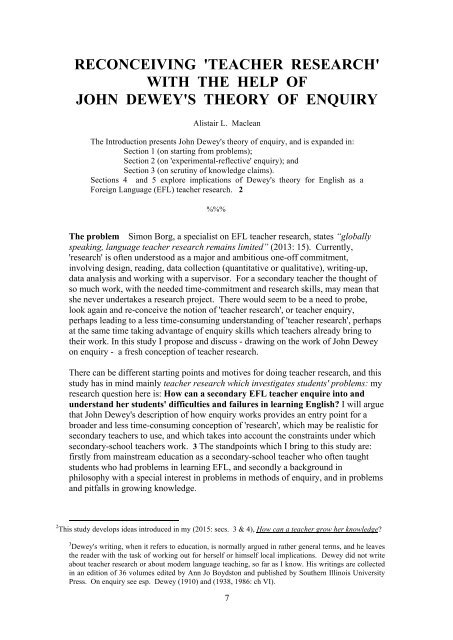RADICAL TEFL
2hqhXJd
2hqhXJd
You also want an ePaper? Increase the reach of your titles
YUMPU automatically turns print PDFs into web optimized ePapers that Google loves.
RECONCEIVING 'TEACHER RESEARCH'<br />
WITH THE HELP OF<br />
JOHN DEWEY'S THEORY OF ENQUIRY<br />
Alistair L. Maclean<br />
The Introduction presents John Dewey's theory of enquiry, and is expanded in:<br />
Section 1 (on starting from problems);<br />
Section 2 (on 'experimental-reflective' enquiry); and<br />
Section 3 (on scrutiny of knowledge claims).<br />
Sections 4 and 5 explore implications of Dewey's theory for English as a<br />
Foreign Language (EFL) teacher research. 2<br />
%%%<br />
The problem Simon Borg, a specialist on EFL teacher research, states “globally<br />
speaking, language teacher research remains limited” (2013: 15). Currently,<br />
'research' is often understood as a major and ambitious one-off commitment,<br />
involving design, reading, data collection (quantitative or qualitative), writing-up,<br />
data analysis and working with a supervisor. For a secondary teacher the thought of<br />
so much work, with the needed time-commitment and research skills, may mean that<br />
she never undertakes a research project. There would seem to be a need to probe,<br />
look again and re-conceive the notion of 'teacher research', or teacher enquiry,<br />
perhaps leading to a less time-consuming understanding of 'teacher research', perhaps<br />
at the same time taking advantage of enquiry skills which teachers already bring to<br />
their work. In this study I propose and discuss - drawing on the work of John Dewey<br />
on enquiry - a fresh conception of teacher research.<br />
There can be different starting points and motives for doing teacher research, and this<br />
study has in mind mainly teacher research which investigates students' problems: my<br />
research question here is: How can a secondary EFL teacher enquire into and<br />
understand her students' difficulties and failures in learning English? I will argue<br />
that John Dewey's description of how enquiry works provides an entry point for a<br />
broader and less time-consuming conception of 'research', which may be realistic for<br />
secondary teachers to use, and which takes into account the constraints under which<br />
secondary-school teachers work. 3 The standpoints which I bring to this study are:<br />
firstly from mainstream education as a secondary-school teacher who often taught<br />
students who had problems in learning EFL, and secondly a background in<br />
philosophy with a special interest in problems in methods of enquiry, and in problems<br />
and pitfalls in growing knowledge.<br />
2 This study develops ideas introduced in my (2015: secs. 3 & 4), How can a teacher grow her knowledge?<br />
3 Dewey's writing, when it refers to education, is normally argued in rather general terms, and he leaves<br />
the reader with the task of working out for herself or himself local implications. Dewey did not write<br />
about teacher research or about modern language teaching, so far as I know. His writings are collected<br />
in an edition of 36 volumes edited by Ann Jo Boydston and published by Southern Illinois University<br />
Press. On enquiry see esp. Dewey (1910) and (1938, 1986: ch VI).<br />
7


